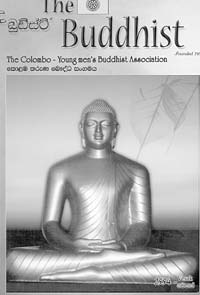|
The Buddhist:
Fountain of knowledge
Dhamma Weerakoon
The Vesak publication of the quarterly journal of the YMBA Colombo,
‘The Buddhist’ contains all round reading material including the
teachings of the Buddha, the practice and historical matters of interest
to Buddhists. It contains twelve articles in English and six in Sinhala
together with a few poems, written by a number of competent writers on
Buddhism and allied subjects.
The Sinhala article on Lumbini, by Saddhasena, provides a validation
to the historically accepted fact regarding the birth place of Prince
Siddhartha. More information with respect to the events and places of
interest in the life of the Buddha is the subject material in another
Sinhala article by Dr Siri Nissanka Perera, which would be useful to the
many Buddhists who visit India on pilgrimage.

‘Buddhism as Humanism with no Expiry Date’ is an article written by
Dr. Ananda Guruge which reminds us of the current wars that have
resulted from violence owing to misplaced religious fervour of misguided
youth.
He quotes a British Clergyman of the eighteenth century which
comments on the notable human attitude to religion as “Men will wrangle
for religion; write for it, fight for it, anything but live for it.”
Since Anagarika Dharmapala addressed the first parliament of World
Religions in Chicago in 1893, Buddhism has been fast gaining popularity
in many countries with an impressive keeness induced among teachers,
researchers, writers and exponents of Buddhism.
Buddhism being a philosophy, a way of life and sensible code of
ethics and not a religion, distinguishes from organized religions of the
world on three grounds. Firstly, it has no centralized authority
interpreting and reinterpreting a set of dogmas in which total belief is
mandatory.
Secondly, it has no priesthood that intermediates between the
adherent and his spiritual goal and claims to have the ritual based
power to grant or deny redemption.
Thirdly, there is no place for mere rites and rituals in Buddhism in
its path for deliverance. One follows this path at will and at ones own
pace.
The only requirement in the practice is the diligence in avoiding all
evil, doing good and keeping a pure mind.
All this is brought into light, reminding the necessity to prepare
ourselves for the event of 2600th anniversary of the Enlightenment of
Siddhartha Gautama, by rededicating ourselves to follow more diligently
the noble teachings of the Buddha.
In relevance to the 2600th anniversary of Enlightenment, Tissa
Devendra recalls how late Prof. G. P. Malalasekara set about preparing
for an international conference in 1950, which gave both impetus and
inspiration for the Buddha Jayanthi celebrations of 1956.
The total absence of any prior experience in the country in
organizing international conferences, the meagre facilities available
for either conference or hosting foreign dignitaries and delegates were
no obstacle to Prof. Malalasekara.
The inaugural conference of the world fellowship of Buddhists itself
was a great success building up a solid foundation of the Buddhist
solidarity that led to the success of Buddha Jayanthi. This article
could be a stimulant for those engaged in the planning of 2600th
anniversary activities, to make good use of the occasion to provide an
impetus to further consolidate the quality of Buddhists through practice
of the Buddhist teachings, going beyond slogans, popular street
decorations and competitions.
There are number of articles that explain important Buddhist topics
such as Nibbana, Vipassana meditation and Path to Deliverance. Sutta
Reflection similes of the ‘Raft and Snake-charmer’ written by Ven.
Henepola Gunaratana Nayaka Thera provides a lucid explanation of the
simile, which is often quoted by many persons without much regard to the
deeper philosophy underlying or the contents of the sutta.
‘Minis Pudgalaya Pilibanda Bauddha Sankalpaya’ an article by A. G. S.
Kariyawasam in Sinhala, is an explanation of the Buddhist concept of a
person. All these articles include material that is very useful to the
reader.
The editorial in both languages by Rajah Kuruppu reminds the reader
of the necessity of the resolve to make a vigorous and sustained effort
to live a harmless life in advance of the 2600th anniversary of
Enlightenment.
In ‘Myth about Suffering and Cessation’, R. L. Ihalamulla reminds
that there is no suffering if there is no birth, but this is not seen by
those who fail to regard birth as suffering but welcome it as an
occasion for celebration. Inability to recognize the fact that new
problems could arise in place of the solved ones in an endless chain, is
another reason why people don’t grasp the truth about suffering.
Further when sensory inputs are received by the sense organs they are
evaluated as pleasant or unpleasant resulting in a reaction either to
welcome or resist them.
One must train to observe these happenings without labelling them as
pleasant or unpleasant, through the practice of meditation.
For those who have doubts about the practicability of the Buddhist
teachings by the laymen, Dr. Dharmasena Hettiarachchi quotes widely from
the Text.
The Buddha has given advice on how the laymen and the clergy should
practice.
There is no need to abandon lay life, but one could advance towards
the final Buddhist goal while performing the obligations in lay life as
well.
Olcott Gunasekara in his article ‘An Economic Impact of observing the
Five Precepts notes how beer production has increased alarmingly, not
only in quantity but in the percentage alcoholic strength as well.
‘Matata Tita’ seems to have little impact.
The extent of offences in relation to alcohol and other substances is
presented with statistics.
The publication contains material that can hold the interest of all
readers with varied interests in different aspects of Buddhist teaching
and related subjects. |



